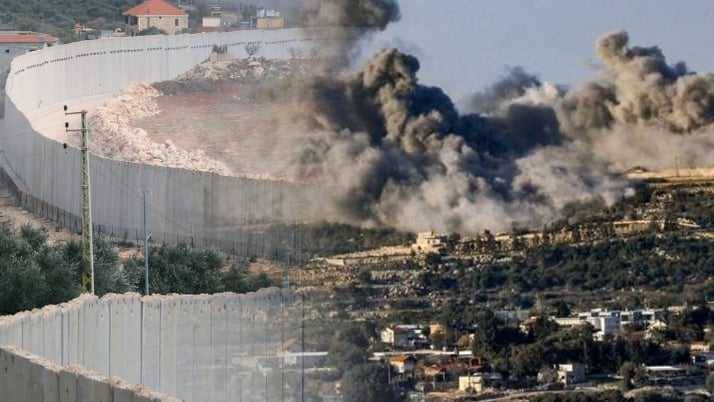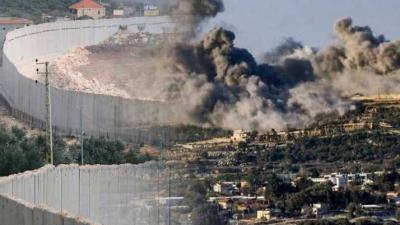Although the immediate cause of what can be described as the most intense and dangerous escalation of ground confrontations on the Lebanese front since October 8 was Israel's severe strike against Hezbollah by assassinating one of its top military leaders along with a group of operatives, the war developments from the recent heated day illustrate implications that extend beyond the immediate trigger for a potential broad war between Israel and Hezbollah, as reported by "An-Nahar."
The events surrounding this widespread escalation demonstrated that Israel is not hesitant to carry out any operation that exceeds the rules of engagement, contrary to prevalent beliefs that it is still avoiding igniting a war on the Lebanese front. The assassination of Hezbollah’s highest-ranking military commander, along with three operatives, on the same day when it had also killed six Hezbollah members on the extreme eastern borders, three of whom were Lebanese, reveals that there is a decision to escalate the provocative pace against Hezbollah, whether to lure it into utilizing more of its missile and drone arsenal, or for a hidden objective that is bringing Israel closer to a significant adventure in Lebanon.
Consequently, it was expected to closely monitor Hezbollah’s reaction yesterday, following the painful blow it received. The response appeared to be a combination of unconventional escalation in terms of the intensity of rocket fire that ignited northern Israel and the nature of some targeted sites, such as a military industry factory, while expanding the scope of targeting. However, the response did not reach the point of crossing the latest boundaries of the rules of engagement, making it difficult to revert to the realities of confrontations without sliding into a comprehensive war. Nevertheless, it can be said that yesterday's confrontations marked the most dangerous trajectory concerning mutual mobilization in operations and their severity, reaching a new peak at least since this front began its movements over eight months ago.
This escalation coincided with the climax of American diplomatic efforts in the region aimed at halting the Gaza war, evident in the eighth tour of U.S. Secretary of State Antony Blinken in the Middle East since the onset of the Gaza conflict. In a press conference he held yesterday in Doha, Blinken addressed the situation in southern Lebanon, saying: "The agreement regarding Gaza will have a tremendous impact on reducing tensions between Israel and Lebanon. We are trying to prevent escalation in southern Lebanon; no one wants a new war there, as 60,000 Israelis cannot return to their homes because of Hezbollah's rockets."
The aggressive escalation began when Israel assassinated on Tuesday night the military commander Taleb Sami Abdullah, described as the highest-ranking military official in Hezbollah to be killed since the start of the war, along with three other members of the military unit responsible for Hezbollah’s activity in the eastern region from Bint Jbeil to the Shebaa Farms, in the town of Jayyous, Tyre district. The Israeli military announced that Hezbollah commander Taleb Abdullah was responsible for planning and executing several operations against Israeli citizens.
Hezbollah’s intense response to the assassination included a series of bombardments exceeding 15 operations, targeting key sites such as, according to their statements: targeting the Blasan factory for military industries specializing in reinforcing and protecting vehicles for the Israeli army in the settlement of Sa’sa with guided missiles, extensive shelling on the command center of the northern brigade in the Ain Zaitim base with dozens of Katyusha rockets, targeting espionage equipment at the Ruisat Al-Aalam site in Kfarshouba hills, shelling the backup headquarters of the northern brigade in the centralized backup base of the Galilee and its stores in Ammiad with dozens of Katyusha rockets, and attacking the air surveillance unit and aerial operations management at the northern direction in the Meron base with numerous Katyusha rockets and artillery shells.
While Israeli army radio reported that around 215 rockets and shells were launched by Hezbollah since yesterday morning towards northern Israel, Israeli warplanes conducted successive airstrikes on the outskirts of several villages and towns in the western Tyre district, while artillery and phosphorus bombardments targeted east of the town of Adaisseh. Warplanes also struck the area between Dair Sryan and Taybeh, and a drone attacked the outskirts of the town of Markaba - Khaleh Makna. Reports indicated that a paramedic from the Islamic health authority was injured and a team from the “Islamic Scout Movement” survived amidst the shelling of Markaba square. In the evening, Hezbollah fired a new batch of rockets at Israeli military positions in western Galilee.
Hezbollah’s Executive Council Chairman, Sayyed Hashem Safi al-Din, threatened the Israeli army with more weeping and wailing in a speech during the funeral of the Hezbollah commander Taleb Sami Abdullah in the southern suburb, stating that if the Israeli army's message from the martyrdom of Abu Taleb was meant to undermine their resolve in supporting Gaza, then our definitive and inevitable response after this noble blood is that we will increase our operations in intensity, boldness, quantity, and quality. He added: "This Israeli army will see who the sons of the Islamic resistance in Lebanon are." He remarked that if the Israeli army is screaming and moaning from what it has suffered in Northern Palestine, it should prepare itself for more weeping and wailing.
The extensive field escalation necessitated governmental action, as caretaker Prime Minister Najib Mikati held a series of diplomatic meetings at the Grand Serail discussing efforts to halt the escalation. In this context, he held an extensive meeting with EU ambassadors dedicated to consulting about the security developments in the south and the war's implications in Gaza on stability in Lebanon, addressing economic and administrative reforms in Lebanon. It was reported that the ambassadors expressed their willingness to assist Lebanon in this regard, and discussions also touched upon the issue of Syrian refugees and its implications on the overall Lebanese situation, according to "An-Nahar."




